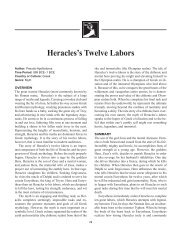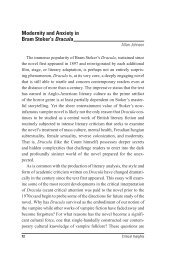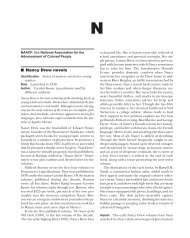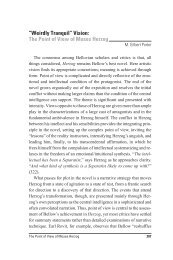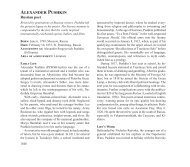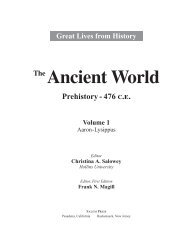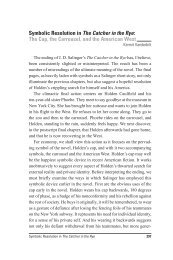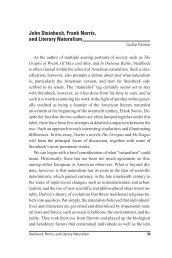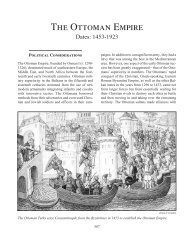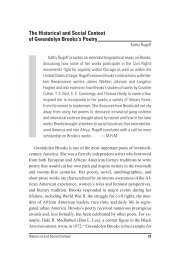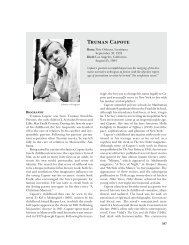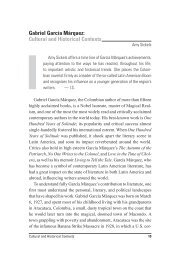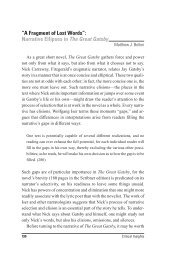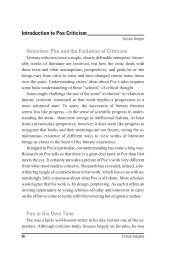You also want an ePaper? Increase the reach of your titles
YUMPU automatically turns print PDFs into web optimized ePapers that Google loves.
Critical Survey of Poetry Nemerov, Howard<br />
and the Law deals mainly with the city, war, and death, it<br />
also contains religious imagery and wit. His poems wail,<br />
like an Old Testament lament—“I have become a gate/<br />
To the ruined city, dry” (“Lot’s Wife”). The poems in<br />
The Image and the Law exhibit ironic detachment as<br />
well as seriousness, for to Nemerov “the serious and the<br />
funny are one.” The dualism in the poems is suggested<br />
in the title.<br />
Guide to the Ruins has a broader scope than his first<br />
collection and reveals artistic growth. The “ruins” are<br />
those created in World War II, although the war is not<br />
actually over. Again, there is duality in the poems; the<br />
poet feels trapped between art-faith and science-reality,<br />
but sides with neither wholeheartedly. His tension between<br />
the two produces a Dostoevskian religious agony<br />
that visits Christianity, but consistently returns to Judaism.<br />
Several poems in Guide to the Ruins unite war and<br />
religion into a pessimism that will become more evident<br />
in later works. Paradoxically, and typical of his dualistic<br />
vision, he celebrates life not only in spite of war but also<br />
because of it.<br />
The Salt Garden<br />
The Salt Garden, while still exhibiting some derivation,<br />
exhibits not only the poet’s own voice but also a<br />
“center,” that center being Nemerov’s interest in nature.<br />
True to his double vision, he contrasts “brutal” nature<br />
with “decent” humankind. The link between the two is<br />
found in liquids such as ocean and blood, which combine<br />
into humankind’s “salt dream,” the call of the subconscious<br />
toward wildness. The poems in The Salt Garden<br />
range from a decent, rational man’s reflection on his<br />
garden to the nightmarish, Freudian dream “The Scales<br />
of the Eyes.” A brilliant combination of the “civilized”<br />
and the “wild” is found in “I Only Am Escaped Alone to<br />
Tell Thee.” By degrees, this poem shows the submerged<br />
anguish of a prosperous nineteenth century woman. The<br />
whalebone stays of her corset are a central image, leading<br />
to other images of sea, mirrors, and light, until “the<br />
black flukes of agony/ Beat at the air till the light blows<br />
out.” The Salt Garden treats not only humanity, “brutal”<br />
nature, and the link between the two, but death as a part<br />
of “time’s ruining stream.” Water, sea, and blood are beyond<br />
moral categories; they are the substance of life. In<br />
this respect, according to Julia Bartholomay in The<br />
Shield of Perseus: The Vision and Imagination of Howard<br />
Nemerov (1972), Nemerov’s perspective is biblical. Water<br />
is creative and purifying; it “sanctifies that which it permeates<br />
and recreates, for all objects are but fleeting<br />
forms on the changing surface of eternity.”<br />
Mirrors and Windows<br />
Nemerov’s interest in nature, which is first evident in<br />
The Salt Garden, continues in The Next Room of the<br />
Dream, Mirrors and Windows, and The Blue Swallows.<br />
Nature, in these poems, has objective reality; it is never<br />
merely a projection of human concerns. Like Robert<br />
Frost, Nemerov not only describes nature as something<br />
“other” than himself but also brings philosophical issues<br />
into his nature poems. In Mirrors and Windows, Nemerov<br />
indicates that poetry helps make life bearable by<br />
stopping it in a frame (poem). It sheds no light upon the<br />
meaning of life or death; it only reveals life’s beauty or<br />
terror.<br />
The Next Room of the Dream<br />
The Next Room of the Dream, a collection of poems<br />
and two verse plays, illustrates Nemerov’s decision to<br />
stay close to what he calls in Journal of the Fictive Life<br />
the “great primary human drama.” His plays Cain and<br />
Endor, based on biblical themes, illustrate his humanitarianism<br />
as well as his quest for ultimate truth. This<br />
quest is ironically expressed in “Santa Claus,” which begins,<br />
“Somewhere on his travels the strange Child/ Picked<br />
up with this overstuffed confidence man,” and ends, “At<br />
Easter, he’s anonymous again,/ Just one of the crowd<br />
lunching on Calvary.”<br />
Nemerov’s plays, however, provide no spiritual resolution<br />
to man’s questions. Stanley Knock in The Christian<br />
Century comments, “Nemerov succeeds only in revealing<br />
the devastating emptiness of contemporary<br />
beliefs.” The poem “Nothing Will Yield” sums up Nemerov’s<br />
perception of human helplessness in the face of<br />
reality; even art is no solution, although poets will continue<br />
to speak “holy language” in the face of despair. In<br />
The Next Room of the Dream, the poems become simpler,<br />
with more precise natural descriptions and more<br />
obvious compassion for humankind.<br />
Nemerov’s dark vision mellows in his later work. In<br />
two later collections of poetry, Gnomes and Occasions<br />
and Sentences, the emphasis is spiritual, the tone elegiac.<br />
In The Western Approaches: Poems, 1973-75, the<br />
topics range from speculation about fate (“The Western<br />
2751



